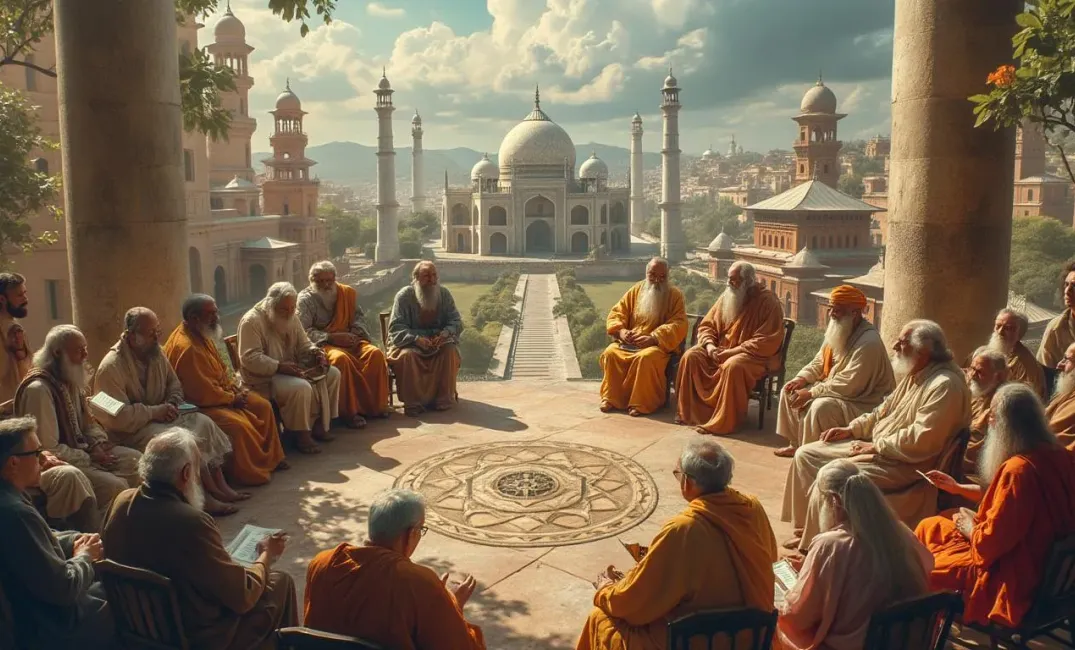Introduction: The Philosopher's Journey
"The unexamined life is not worth living." — Socrates
Philosophy, the pursuit of knowledge and understanding, has been an enduring guide in humanity's quest to unravel the mysteries of existence. This exploration delves into the legacy of human philosophy, examining its evolution, impact, and continued relevance in shaping society, ethics, and thought through time. From ancient sages to modern thinkers, philosophy's journey is a testament to humanity's insatiable curiosity and desire for truth.
The Dawn of Philosophical Thought
Ancient Origins
- Eastern Philosophies: In India, China, and other parts of Asia, philosophy emerged around principles of harmony, duty, and the nature of reality. Confucius emphasized ethical governance and personal morality, while Laozi introduced Daoism, promoting simplicity and unity with nature.
- Western Beginnings: In ancient Greece, philosophy sought to understand the natural world and human existence. The Pre-Socratics, including Thales and Heraclitus, speculated about the fundamental nature of reality and change, laying the groundwork for later philosophical inquiry.
Classical Flourishing
- The Golden Age of Greece: The Socratic method introduced by Socrates transformed philosophy into a dialogue aimed at seeking truth. Plato's idealism and Aristotle's empirical investigations forged foundational frameworks that influenced centuries of philosophical thought.
- Philosophy in the Roman World: Roman philosophers like Marcus Aurelius and Seneca adapted Greek philosophies into practical teachings, emphasizing Stoicism's virtues of wisdom, courage, and emotional resilience.
Medieval and Renaissance Philosophical Illuminations
Philosophical Synthesis
- Christian Scholasticism: Medieval Europe saw the merging of Aristotelian philosophy with Christian theology, where thinkers like Thomas Aquinas reconciled faith and reason, elevating philosophical inquiry within religious contexts.
- Islamic Golden Age: Islamic philosophers, such as Avicenna and Averroes, preserved and expanded upon Greek philosophy, introducing innovations in metaphysics, science, and ethics, that rekindled philosophical interest across cultures.
Renaissance Rebirth
- Humanism: The Renaissance, a period of revival and innovation, spotlighted human potential and wisdom beyond religious doctrines. Philosophers like Erasmus promoted humanist values, blending classical learning with contemporary insights.
- Scientific Revolution: Philosophers like Francis Bacon pioneered the scientific method, applying skeptical reasoning to empirical observation, setting the stage for modern scientific inquiry and philosophical empiricism.
The Enlightenment and Modernity
Enlightenment Thought
- Reason and Rationality: The Enlightenment heralded an era where reason and science were paramount. Philosophers such as Immanuel Kant examined human knowledge and ethics within rational frameworks, advocating for autonomy and moral duty.
- Political Philosophy: Theories by Locke, Rousseau, and Hobbes explored human nature, governance, and rights, influencing democratic foundations and inspiring revolutions through assertions of liberty and social contracts.
Contemporary Exploration
- Existentialism and Identity: Figures like Søren Kierkegaard and Jean-Paul Sartre delved into existentialism, exploring themes of freedom, authenticity, and the individual's confrontation with an absurd world.
- Analytic and Continental Divides: Philosophy branched into analytic and continental traditions, addressing language, consciousness, and phenomenology, with philosophers like Ludwig Wittgenstein and Michel Foucault expanding philosophical boundaries.
Philosophy's Influence on Societal Transformation
Ethics and Morality
- Moral Philosophies: Ethical theories from utilitarianism to deontology have guided policy-making, healthcare, and legal systems, probing the nature of right and wrong and informing moral decision-making in society.
- Environmental Ethics: Contemporary concerns about sustainability have engaged philosophers in debates around ecological ethics, stewardship, and humanity's responsibility to future generations.
Technology and Philosophy
- Philosophy of Technology: As technology redefines existence, philosophers question its influence on identity, privacy, and human-machine relationships. Figures like Donna Haraway examine cyborg anthropology and posthumanism's implications.
- AI and Ethics: Philosophical dilemmas arise in AI development, exploring themes of consciousness, ethical autonomy, and the moral considerations of artificial entities in society.
Philosophical Challenges and Future Horizons
Bridging Cultural Philosophies
- Global Dialogue: Cross-cultural exchanges enrich philosophical inquiry, integrating diverse perspectives into a pluralistic framework that transcends singular narratives, encouraging inclusive dialogues on global issues.
- Philosopher-Citizens: As global citizens, philosophers are called upon to apply philosophical insights to contemporary challenges, fostering informed, ethical leadership that embraces intercultural understanding.
Philosophy in Education
- Curricular Integration: Embedding philosophy in education equips students with critical thinking skills, ethical reasoning, and reflective capacities, nurturing individuals prepared for complex societal challenges.
- Philosophy Beyond Academia: Public philosophy democratizes philosophical discourse, engaging with broader audiences to address pressing societal issues through accessible and impactful dialogues.
Conclusion: Philosophy's Enduring Legacy
"The philosophy of one century is the common sense of the next." — Henry Ward Beecher
Philosophy remains a guiding light, illuminating pathways for humanity's quest for meaning, understanding, and progress. Its legacy is woven into the fabric of cultural, ethical, and intellectual landscapes, offering a deep well of wisdom that continues to inspire, challenge, and evolve alongside human society.
As we face uncertainties of the future, the philosophical tradition offers continuity and change, confronting existential questions with fresh perspectives and timeless insights. In this endless pursuit, philosophy encourages a synthesis of reason, empathy, and imagination, fostering resilience in the face of complexity and ambiguity.
In embracing philosophy, humanity advances with a keener awareness of its shared journeys, striving for coherent, hopeful realignments with the mysterious tapestry of existence. As explorers venture across the cosmos, philosophy's timeless quest will persist, nurturing curiosity, integrity, and the perpetual longing to comprehend the universe and our place within it.
PHILOSOPHY, SOCIETY, EDUCATION, HISTORY, ETHICS, EXISTENCE, CROSS-CULTURAL, KNOWLEDGE, PHILOSOPHY OF TECHNOLOGY

